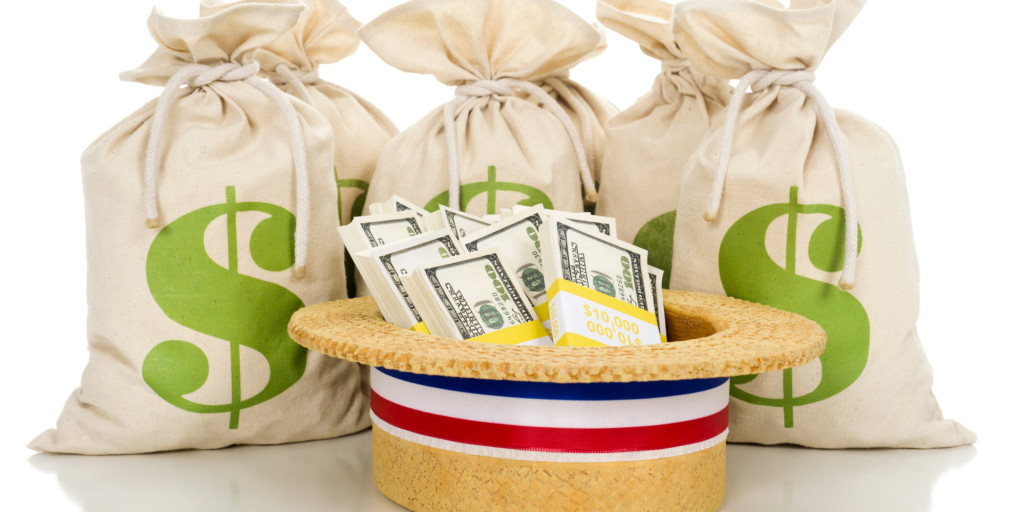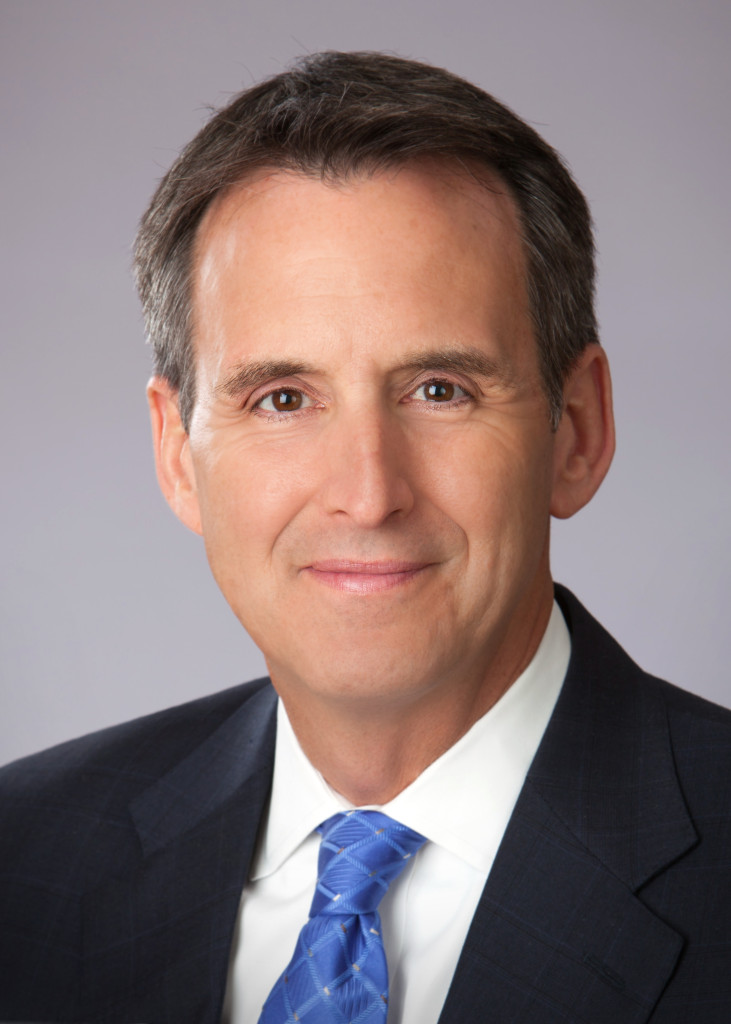Data: Nearly five dozen given a third of all 2016 campaign cash

It took Ted Cruz three months to raise $10 million for his campaign for president, a springtime sprint of $1,000-per-plate dinners, hundreds of handshakes and a stream of emails asking supporters to chip in a few bucks. One check, from one donor, topped those results. New York hedge fund magnate Robert Mercer‘s $11 million gift to a group backing the Texas Republican’s White House bid put him atop a tiny group of millionaires and billionaires whose contributions already dwarf those made by the tens of thousands of people who have given to their favorite presidential candidate. An Associated Press analysis of fundraising reports filed with federal regulators through Friday found that nearly 60 donations of a million dollars or more accounted for about a third of the more than $380 million brought in so far for the 2016 presidential election. Donors who gave at least $100,000 account for about half of all donations so far to candidates’ presidential committees and the super PACs that support them. The review covered contributions to outside groups that can accept checks of any size, known as super PACs, and to the formal campaigns, which are limited to accepting no more than $2,700 per donor. The tally includes donations from individuals, corporations and other organizations reflected in data filed with the Federal Election Commission as of Friday, the deadline for super PACs to report for the first six months of the year. That concentration of money from a small group of wealthy donors builds on a trend that began in 2012, the first presidential contest after a series of court rulings and regulatory steps that created the super PAC. They can openly support candidates but may not directly coordinate their actions with their campaigns. “We have never seen an election like this, in which the wealthiest people in America are dominating the financing of the presidential election and as a consequence are creating enormous debts and obligations from the candidates who are receiving this financial support,” said Fred Wertheimer, president of Democracy 21, a Washington-based group that wants to limit money in politics. Others see an upside to the rainmakers. “Big money gives us more competitive elections by helping many more candidates spread their message,” said David Keating, director of the Center for Competitive Politics, which advocates for fewer campaign finance limits. For any number of reasons, these donors are willing to give so generously. Some may have a business that stands to gain from an executive branch that changes how an industry is regulated, while others hope for plum administration assignments, such as a diplomatic post overseas or a cabinet position. Many say their contributions, which the U.S. Supreme Court has recognized as equivalent to free speech, merely reflect their intense belief in a particular candidate – and in the political system in general. “I’d think that the fact that I’m willing to spend money in the public square rather than buying myself a toy would be considered a good thing,” said Scott Banister, a Silicon Valley investor who gave $1.2 million to a super PAC helping Kentucky Sen. Rand Paul in the Republican presidential race. “The voters still, at the end of the day, make the decision,” he said. “You can spend $1 billion trying to tell the voters to vote for a set of ideas they don’t like, and they will still vote against the candidate.” For Florida developer Al Hoffman, financial support of the state’s former governor, Jeb Bush, is personal. A longtime friend and political contributor to the Bush family, he gave $1 million to Bush’s super PAC, contributing to its record-setting haul of $103 million in the first six months of the year. Hoffman was ambassador to Portugal during former President George W. Bush‘s second term. He said he sometimes offered Bush advice during his time as Florida’s governor, but doesn’t expect to influence a Jeb Bush administration. “I’d just like to see one,” he said. While the existence of high-dollar donors is more pronounced on the Republican side, they’re also among those giving to the super PAC backing Democratic front-runner Hillary Rodham Clinton. Seven donors of at least a million dollars accounted for almost half of the total collected by Priorities USA Action. Entertainment mogul Haim Saban and his wife, Cheryl, led with a $2 million gift, and hedge-fund billionaire George Soros, historically one of the Democratic Party’s biggest givers, donated $1 million. But no one has capitalized on the new era of big money like Bush. After announcing plans to explore a presidential run in December, Bush embarked on a nearly seven-day-a-week travel schedule to raise money for his Right to Rise super PAC. Bush navigated limits on how candidates can raise money for super PACs by playing coy about his intentions. Now that he is officially a candidate, he has left Right to Rise in the hands of his trusted strategist and friend, Mike Murphy. He’s not alone in the use of super PACs to fuel a presidential run. New Jersey Gov. Chris Christie and Wisconsin Gov. Scott Walker are too new to the presidential contest, announcing only weeks ago, to have filed any reports about their campaigns’ finances. Yet super PACs that sprang up months ago to support them show their efforts will be financially viable: A group backing Christie raised $11 million, while two supporting Walker brought in $26 million. Such totals put them well ahead of Paul, former technology executive Carly Fiorina, former Arkansas Gov. Mike Huckabee and former Sen. Rick Santorum – who all began their presidential campaigns in the spring. Cruz’s super PACs, meanwhile, didn’t just get the $11 million from Mercer. They also received a $10 million donation from Toby Neugebauer, an energy investor in Texas, while the Texas-based Wilks family pooled together a $15 million gift. Super PACs will spend as campaigns do, investing in polling and data sets, hiring employees in key states and buying pricey television and digital advertising, direct mailings and phone calls to voters.
In Iowa, Tim Pawlenty’s short campaign still casts a long shadow

Long before the 2012 Iowa caucuses, Tim Pawlenty was already out of the race for president. Yet his short-lived campaign lives on, casting a shadow over the Republicans now wooing voters in the state that kicks off the White House contest. Four years after Pawlenty staked his presidential bid on Iowa’s traditional summer straw poll, several top Republicans plan to skip the event. Mindful of the outsized resources the former Minnesota governor sank into Iowa, some campaigns aim to run leaner organizations in the state. And they’re also stockpiling money in super PACs, which could help them stay afloat should they suffer a misstep or strategic blunder as Pawlenty did in the first-to-vote state. “You don’t have to spend a ton of dough in the modest-sized state of Iowa to have a result that keeps you going,” Pawlenty said in an interview with The Associated Press in which he reflected on his own missteps and offered advice for those seeking to avoid a similar fate. Friendly and mild-mannered, Pawlenty is well-liked by fellow Republicans. But in Iowa, GOP political operatives now whisper his name as a way to discredit their opponents — and scramble to deflect any comparisons to their own candidate. One of the first Republicans to make clear his plans to run in 2012, Pawlenty never gained the traction in Iowa or nationally that his solid résumé and record suggested he could. After a poor performance in an early debate, he zeroed in on the Iowa GOP’s summer straw poll as the way to save his campaign. Straw polls measure nothing but the sentiments of those who show up, and Iowa’s was a true circus in 2012. Minnesota Rep. Michele Bachmann spent $2 million on the event, going so far as to hire country singer Randy Travis to entertain her supporters. Eventual GOP presidential nominee Mitt Romney didn’t take part, and Pawlenty finished a distant third behind Bachmann and former Texas Rep. Ron Paul. The morning after the straw poll, Pawlenty ended his campaign. Few top 2016 contenders are eager to set themselves up for that kind of embarrassment. Mike Huckabee, the former Arkansas governor who won the 2008 Iowa caucuses, has joined former Florida Gov. Jeb Bush and Florida Sen. Marco Rubio in saying he’ll stay away. “The gig is up on it,” Pawlenty said. “Everybody should just chill out about its significance.” Bush, Rubio and Huckabee all say they plan to compete in the caucuses. Some Iowa Republicans question how aggressively Bush will run in a state where his more moderate positions on immigration and education could be a liability. Iowa operatives also say they’re waiting for Rubio to make more appearances in Iowa. Some note that he’s yet to hire a state director, a key post in a place where detailed knowledge of the caucus process and Iowa’s 99 counties is a coveted commodity. In announcing Rubio’s decision to forgo the straw poll, his communications director, Alex Conant, a veteran of Pawlenty’s 2012 White House run, emphasized the senator planned to run a “lean campaign.” Some straw poll supporters fear they’re watching the demise of an event that has been a tradition since 1979 and a big moneymaker for the state party. “What I don’t see being debated enough or discussed enough is the risk inherent in not participating,” former Iowa GOP chairman Matt Strawn said. “In a field as crowded as we have, non-participation means that you are potentially feeding the opportunity for another campaign to fill the vacuum.” That’s part of the decision facing Wisconsin Gov. Scott Walker, whose advisers say he won’t announce his straw poll plans until he announces his overall 2016 plans in early summer. Walker has already had to swat away Pawlenty comparisons, made based only on the fact both are Midwestern governors with blue-collar backgrounds. Given his strength in early Iowa polls, he risks failing to meet expectations if he competes in the straw poll but loses to weaker candidates. But even if Walker or another top-tier candidate suffers an embarrassing straw poll defeat, it’s unclear whether it would have the kind of debilitating effect it had on Pawlenty. He woke up the next morning suddenly unable to raise money to keep his campaign afloat. With donors able to contribute unlimited cash to super PACs, candidates have a way to stockpile money with independent groups that can run ads and supplement campaign activities. One wealthy benefactor might be enough to sustain a candidate through a rough patch. Super PACs were legal when Pawlenty ran in 2012, but largely untested. Pawlenty recalled a conversation with Romney as both were weighing campaigns in which the eventual 2012 Republican nominee espoused the importance of the big money groups. “I remember thinking I didn’t even know what a super PAC was,” Pawlenty said. The $5 million Pawlenty raised for his campaign looks quaint compared with the staggering figures expected in 2016. Bush, among the most aggressive fundraisers, is expected to pull in $100 million for his super PAC by the time he announces his campaign next week. Pawlenty, who has left politics and is now the CEO of a financial services lobbying firm in Washington, says he regrets many of the decisions he made in Iowa four years ago. He laughs off questions about whether his legacy will be the death of the Iowa straw poll, but says his experience may have been the breaking point for a change that was years in the making. “Maybe my campaign was the capstone,” he said. Republished with permission of The Associated Press.


